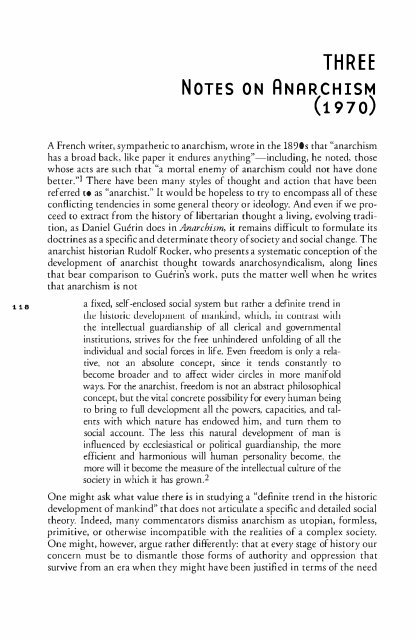Chomsky on Anarchism.pdf - Zine Library
Chomsky on Anarchism.pdf - Zine Library
Chomsky on Anarchism.pdf - Zine Library
Create successful ePaper yourself
Turn your PDF publications into a flip-book with our unique Google optimized e-Paper software.
THREE<br />
NOTES ON ANARCHISM<br />
(1970)<br />
U8<br />
A French writer, sympathetic to anarchism, wrote in the 18905 that "anarchism<br />
has a broad back, like paper it endures anything"-induding, he noted, those<br />
whose acts are sllch that "a mortal enemy of anarchism could nm have d<strong>on</strong>e<br />
better."l There have been many styles of thought and acti<strong>on</strong> that have been<br />
referred (0 as "anarchist." It would be hopeless to try to encompass all of these<br />
c<strong>on</strong>Aicring tendencies in some general theory or ideology. And even if we proceed<br />
(0 extract from the history of libertarian thought a living, evolving traditi<strong>on</strong>,<br />
as Daniel Guerin does in <strong>Anarchism</strong>, it remains difficult (Q formulate its<br />
doctrines as a specific and determinate theory of society and social change. The<br />
anarchist his(Qrian Rudolf Rocker, who presems a systematic c<strong>on</strong>cepti<strong>on</strong> of the<br />
development of anarchist thought towards anarchosyndicalism, al<strong>on</strong>g lines<br />
that bear comparis<strong>on</strong> to Guerin's work, puts the matter well when he writes<br />
that anarchism is not<br />
a fixed, self-enclosed social system but rather a definite trend in<br />
die histuric deveiu!-,lIIent uf lIIankind, which, in CuntraSt widl<br />
the intellectual guardianship of all clerical and governmental<br />
instituti<strong>on</strong>s, strives fo r the free unhindered unfolding of all the<br />
individual and social forces in life. Even freedom is <strong>on</strong>ly a relative,<br />
nOt an absolute c<strong>on</strong>cept, since it tends c<strong>on</strong>stantly to<br />
become broader and to affecc wider circles in more manifold<br />
ways. For the anarchist, freedom is not an abstract philosophical<br />
c<strong>on</strong>cept, but the vital c<strong>on</strong>crete possibility for every human being<br />
to bring to full development all the powers, capacities, and talents<br />
with which nature has endowed him, and turn them to<br />
social account. The less this natural development of man is<br />
influenced by ecclesiastical or political guardianship, the more<br />
efficient and harm<strong>on</strong>ious will human pers<strong>on</strong>ality become, the<br />
more will it become the measure of the intellectual culture of the<br />
society in which it has grown.2<br />
One might ask what value there is in studying a "definite trend in the historic<br />
developmenr of mankind" that does nOt articulate a specific and detailed social<br />
theory. Indeed, many commenrators dismiss anarchism as utopian, formless,<br />
primitive, or otherwise incompatible with the realiries of a complex society.<br />
One might, however, argue rather differently: that at every stage of history our<br />
c<strong>on</strong>cern must be to dis man de those forms of aurhority and oppressi<strong>on</strong> that<br />
survive from an era when they might have been justified in terms of the need

















